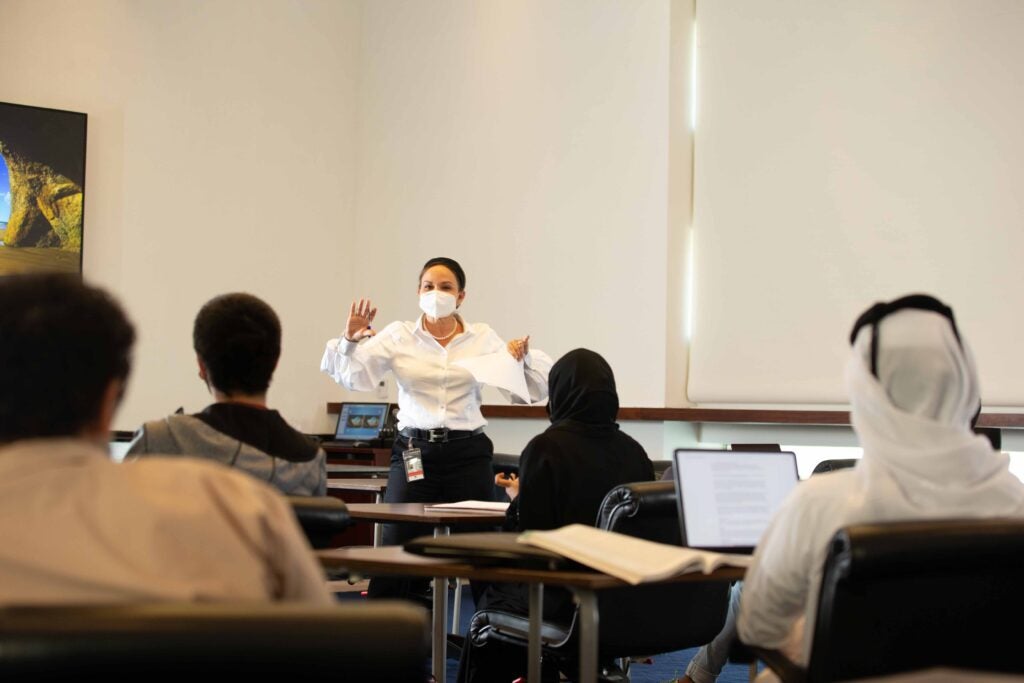Academic Accommodations

Georgetown University in Qatar is committed to providing academic support for all students and to integrating students with disabilities as fully as possible into all aspects of university life.
The Office of Academic Services (OAS) fulfills this mission by providing the following:
- Support services to help assure equal opportunity for students with special needs and disabilities.
- Academic accommodation for Students with diagnosed disabilities in accordance with the Americans with Disabilities Act (ADA) and Section 504 of the Rehabilitation Act of 1973.
- Assistance in skill areas necessary for academic achievement.
Definition of a Disability
A disability is defined as “any mental or physical condition that substantially limits one or more of the major life activities” (Americans with Disabilities Act of 1990). These may include: physical disabilities, psychological disabilities, neurological impairments such as learning disabilities and attention deficit/hyperactivity disorder, or chronic health problems. Examples of major life activities include such functions as breathing, seeing, hearing, speaking, walking, learning, working, performing manual tasks, and self-care.
Types of Disabilities
Some disabilities that may require accommodations include but are not limited to:
- Attention deficit disorder (ADD)
- Blindness/visual impairment
- Cancer
- Cerebral Palsy
- Deafness/hearing impairment
- Epilepsy
- Heart disease
- Multiple sclerosis
- Orthopedic/mobility impairment
- Psychiatric disability
- Specific learning disability
- Speech/language impairment
Procedure for Receiving Academic Accommodations
Students who been diagnosed with a disability or medical condition by their physician should bring Required Documentation for Academic Accommodation to the Student Wellness & Counseling Center (located on the 1st floor). Documents submitted by the student will be reviewed by the appropriate university personnel, and the university will determine if accommodations are appropriate and determine reasonable accommodations by completing the following steps:
- A member of the Student Wellness and Counseling Center will review all documentation to determine whether the student is eligible to receive accommodation services.
- If the university determines that an accommodation is appropriate, a counselor from the Student Wellness & Counseling Center will arrange a meeting with the student to determine appropriate services and accommodations.
- If accommodations are recommended, the student is responsible for notifying the Associate Director of Academic Services that they require an accommodation and requesting time to meet.
- The Associate Director will schedule time with the student to discuss what their accommodations mean, how to use them, and policies and procedures for implementing accommodations, including an overview of the Accessibility Information Management System (AIM).
- The student then notifies OAS of the courses for which they would like to use accommodations and provides permission for a letter to be sent to their professor(s) detailing the accommodation. OAS issues a notification letter to faculty outlining the recommendations and procedures for implementation.
- The student is also responsible for speaking with his/her professors to discuss their learning needs and for notifying the professor when they elect to use accommodations.
Temporary Accommodations
GU-Q is committed to supporting the academic success of all students and recognizes that certain life events may inhibit this progress. Students who suffer a temporary injury (e.g., a broken arm or leg) and require assistance are encouraged to immediately contact their academic dean. In the event that the injury occurred while the student was participating in a Georgetown intercollegiate athletic event, the student should also notify the Student Affairs Department.
While the Americans with Disabilities Act (ADA) does not recognize temporary disabilities as a disability for which accommodation is legally mandated, the Academic Affairs Department, Student Wellness & Counseling Center, and when appropriate, the Student Affairs Department, are available to provide support. Please notify these departments about any injuries promptly so that we can collaborate and coordinate reasonable support efforts. In particular, the academic deans should be informed about any injury that will impact a student’s academic responsibilities, so that they may collaborate with the student to develop a management plan for the recovery period.
For Administrators: The Office of Academic Services and Student Wellness & Counseling Center are available resources when advising students with temporary injuries.
Parking Accommodations
Students with either a temporary or permanent disability may be eligible for a parking accommodation.